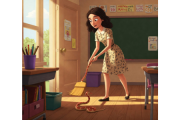Once we were settled in our new home, we were able to fly to Grenada to inspect the True Blue property my parents had put a down payment on. Four of us including the pilot flew in a Camair light aircraft from Caracas to Pearls Airport in Grenada. For part of the trip, my father, a former wartime fighter pilot, was at the controls. My mother, with baby brother Nigel, flew on a regular BWIA (British West Indian Airways) Viscount flight there a few hours later. While we waited for them to arrive, my other brother Desmond and I were free to wander about in the unattended control tower, climbing up unhindered to see the equipment necessary to bring passenger aircraft safely down. As it was lunch time, Dad took us across the street to a small café for lunch. As soon as the proprietor saw us coming, he ushered us past seated customers in the dining room to a curtained alcove at the back. I immediately guessed that this unusual deference was extended to us because we were white, but I was uneasy about this special treatment. It was neither looked-for nor desired. We lived in a country where nearly all of its citizens were darker-skinned than we were, and it had never made us feel superior to those whose native country and culture was theirs, not ours. We were merely guests in their land, and had never seen acts of racism in Venezuela ourselves. I assume that the treatment we received may have been due to the fact that Grenada was then still a colony under the Union Jack, but I did not like the favouritism. There was no call for it: we were merely visitors, not royalty. When my mother’s flight landed, we were taken by a True Blue agent to the Silver Sands resort, and then to the future site of the company’s proposed community. Apart from the sparkling ‘true blue’ Caribbean, not theirs to sell in any case, pegged-out lots of long grass, and a dirt road or two, there was not much to see, as in retrospect is easy to explain. Not long afterwards, the company declared bankruptcy, closed its offices, and all moneys invested disappeared, several thousands in U.S. dollars in our case. My parents engaged a lawyer to seek compensation, but nothing came of it. Grenada was granted independence only 14 years later, as part of British decolonization efforts.

A Young Peter Scotchmer with his two brothers and his mum at Pearls Airport in Grenada in 1961.
A photograph prominently displayed in our Ottawa home for many years showed Dad with his sons, two of us holding papier-mache devil masks acquired in San Francisco de Yare, a small town some seventy kilometers from Caracas. Tourists flocked there much as they are still drawn to the ritual religious processions of El Dia de Los Muertos (The Day of the Dead) in Mexico. We had gone there on a day trip in 1960 on Corpus Christi Day some time after Easter to see the traditional diablos danzantes, or dancing devils, perform in their costumes of red shirts and trousers and grotesque horned masks. The tradition reputedly stems from the comment of a frustrated priest some four centuries earlier bemoaning the lack of volunteers to carry the Blessed Sacrament to church on Corpus Christi Day, saying that if no faithful could be found to perform this duty, “the devils will come.” So they do today, dancing through the streets accompanied by music until they reach the church, at which point they ‘fight’ with its guardians until they surrender and kneel down before the Sacrament placed in front of them. There are similar processions in other Venezuelan towns, where the devils enter the church before falling prostrate in submission. When we were in Yare, they did not enter it. This folk tradition of Good vanquishing Evil is very popular with tourists, who eagerly pay high prices for the most artistic masks. The two we bought there decorated our Ottawa home for 50 years, only a bit dusty for their long stay on the wall.




